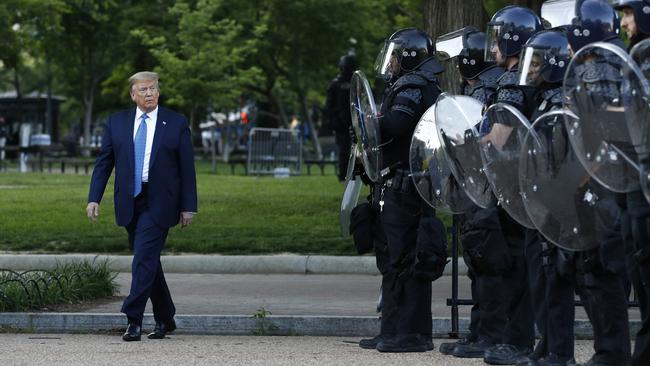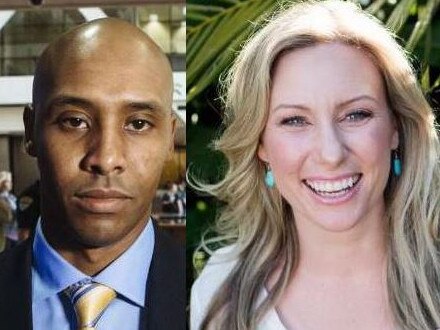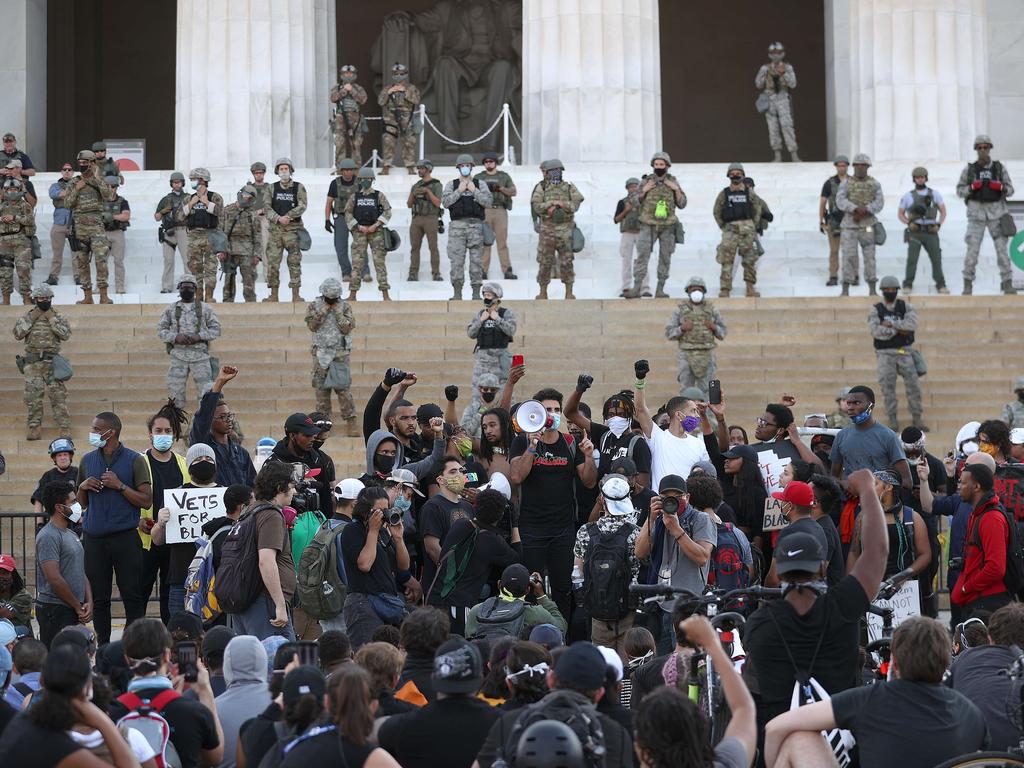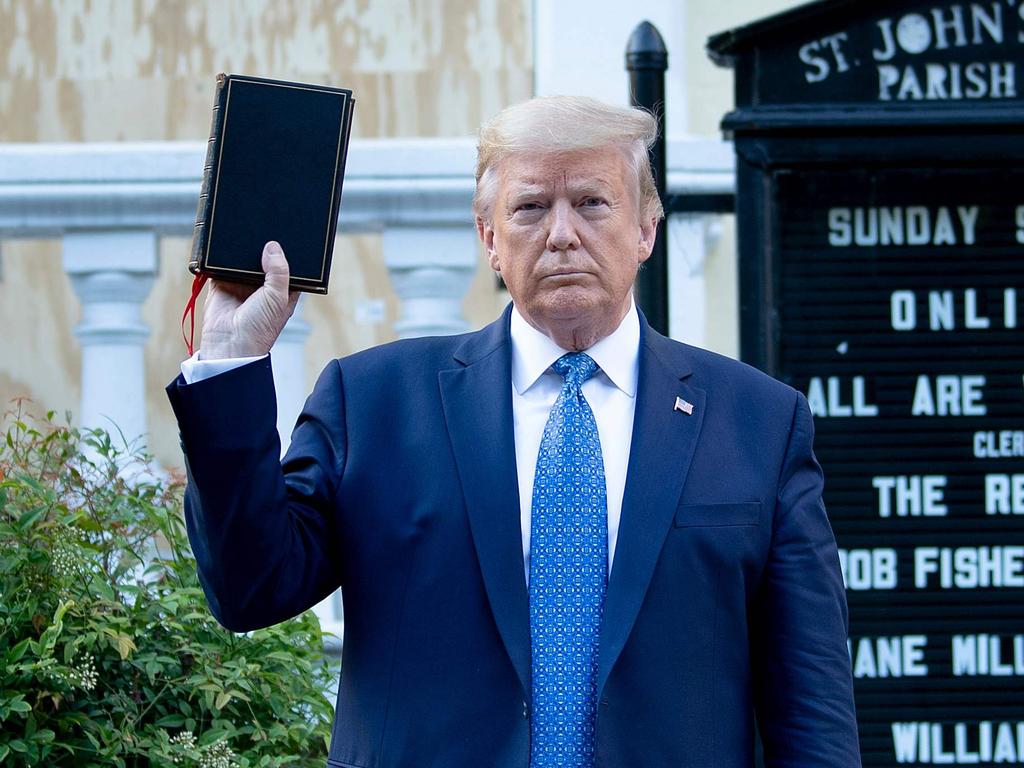
Floyd is fairly passive, his hands cuffed behind his back, outnumbered by police four to one. He is reluctant to get into the police car and is then pinned face down on the street. For almost nine minutes officer Derek Chauvin kneels on the back of his neck.
Passers-by, black and white, yell at Chauvin to get off Floyd, that he’ll kill him. But even when Floyd becomes unresponsive, Chauvin continues to keep his knee on Floyd’s neck.
Floyd begs for his life — “I can’t breathe”. His call “Mama!” is terrible. One officer suggests rolling Floyd on to his side. Chauvin seems to mock Floyd, telling him he should “get up and get in the car”.
“I will, I will,” Floyd replies.
But Chauvin just repeats the taunt, telling Floyd to get up even as he is kneeling on his neck.
Apart from the sheer terror and inhumanity of this encounter, two other things are striking. Chauvin is aware people are filming him. That displays either unbelievable arrogance or stupidity, or perhaps both.
And finally, for almost the whole time, Chauvin keeps his hand in his pocket — a kind of ostentatious, theatrical touch.
This theatricality helps explain why the killing has had an effect similar to an act of terrorism. The act itself was intensely evil, but it is also perfectly designed to transfix public attention in this media, and internet-dominated age.
Notwithstanding the riots and the demonstrations, at one level the death has united America. I have not heard a single voice in any part of the American debate that hasn’t condemned Chauvin’s actions. No one thinks this is justifiable or comes anywhere near a grey zone.
US President Donald Trump, for all the criticism his words and actions have provoked, has been as forthright as anyone in condemning the killing. Among many statements of this kind, Trump said that all Americans had been “rightly sickened and appalled by the brutal death of George Floyd”.
Where Trump has been criticised, however, is in his denunciations of the protesters who had broken various city curfews and the riots, looting, assaults and destructiveness of some of the subsequent demonstrations.
The US has seen more deadly race riots than the ones of the past week. In 1992 a jury acquitted four Los Angeles police officers of using excessive force after they had savagely beaten Rodney King, which was also caught on camera. In the riots after that, 63 people were killed.
But probably not since the 1960s has the US seen such widespread rioting connected with racial issues as it is seeing today.
At this point, civilised opinion diverges. Everyone is rightly horrified by the killing of Floyd. But there is a legitimate debate about how much it represents deep structural racism in the US, even in the nation’s police forces, and how much it was just a terrible action by a shocking individual.

In 2017, also in Minneapolis, Justine Damond Ruszczyk, an Australian, was shot and killed by policeman Mohamed Noor. She had rung the police about what she thought was a sexual assault happening behind her house. When she approached the police car, she was shot by Noor. As it happens, Damond was white and Noor was black. I don’t think that had any relevance at all, and neither did anyone else. Although it was a tragic incident, it didn’t really reveal any wider cultural pattern. It wasn’t given wider significance. This is only relevant to suggest that not everything is racial.
The outrage at Floyd’s death is so overwhelming that surely anyone who is seen as crass and unsympathetic, as Trump has been, would suffer politically.
This is by no means certain. In fact, based on all the history, Trump is more likely to benefit in November’s election from the tough stance he has taken against the looters and rioters.
Trump declared: “I will fight to protect you. I am your President of law and order and an ally of all peaceful demonstrators.”
And, of course, he used a lot of tough language against rioters and looters. The longer civil disorder goes on, the more likely it is that Trump will gain some advantage from it at the election.
The comparison everyone makes is the 1968 election. Huge demonstrations and race riots in the months before the election, especially after the assassination of Martin Luther King in April that year, contributed, paradoxically, to Richard Nixon’s victory on a law-and-order platform. Not only that, there were demonstrations against Nixon all through his presidency, but he won re-election in a landslide in 1972.
Barack Obama was notable not only for being the first African-American president, but for being the first northern liberal to win the presidency for the Democrats since John F. Kennedy in 1960. From 1960 to 2008, 48 years, is a long time for liberals not to win.
The Democrats who won the presidency in that time — Lyndon Johnson, Jimmy Carter and Bill Clinton — were all southerners, and in the case of Carter and Clinton ran as religious and social conservatives. As governor of Arkansas, Bill Clinton made a point of breaking off his early presidential campaign to return to Arkansas and oversee the execution of a convicted killer, incidentally a black man, just to underline his support for the death penalty. Conversely, Michael Dukakis lost in 1988 to George HW Bush partly because Dukakis was portrayed as soft on crime as governor of Massachusetts.
In Australia, there is almost an iron law that the bigger the demonstration you get in the streets in support of your cause, the more heavily you will lose at the ballot box. John Howard’s decision to send troops to Iraq provoked some of the largest demonstrations in Australian history in protest. Howard increased his majority at the next election.
But the US electorate is more liberal than it was. That the Floyd killing came amid the roiling unemployment and the setback to impoverished African-American communities brought about by the coronavirus pandemic, reinforces the feeling that the system is rigged against blacks.
But civil disorder, violence and street protests generally help parties of the centre-right. Nor can meaningful economic and social progress for blacks proceed on the basis that whites have collective guilt for shocking actions of particular individuals.
Trump is often unseemly, but in focusing on law and order he may be saying things that Americans will increasingly want to hear.







The death of George Floyd at the hands of a Minneapolis policeman is heartbreaking and traumatic to watch. If I hadn’t seen it, I would scarcely have believed it.